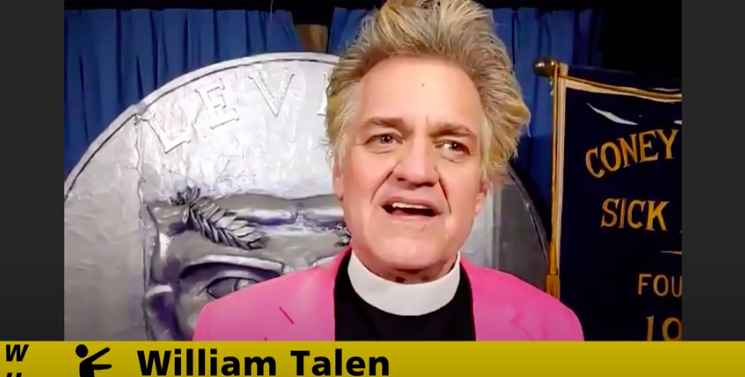The Doomsday Clock vs. Reverend Billy

On the video podcast I co-host, When Humanists Attack!!, I recently had the pleasure of interviewing one of the greatest performance artists working today, Bill Talen, AKA Reverend Billy of the Church of Stop Shopping. Billy’s message has been resounding in my head ever since—it was echoing when I learned about the latest pronouncement from the Bulletin of Atomic Scientists about its famous “Doomsday Clock.” I’ve written about that clock before, but this time my ideas came out a little too strong to fit snugly within the respectable parameters of the fit-to-print. So I’ll just post them here. Let me know what you think.
***
WE’RE IN IT NOW
Has COVID-19 Stalled Progress Toward Doomsday?
Roger Kimmel Smith
January 29, 2021
On Wednesday, the Bulletin of the Atomic Scientists sent out a call reminding us that its well-known “Doomsday Clock” stands at one hundred seconds to the unthinkable. It is the closest humanity has ever been to the midnight hour of downfall and demise—yet no closer than it was a year ago, when the Bulletin‘s Science and Security Board advanced the clock by one-third of a minute from the “two-minute warning” it issued in 2018.
Coulda fooled me. It sure feels like we’re making better time than that.
What about 2020, and the coronavirus? Perhaps we can say it’s applied some brakes on our headlong rush to oblivion—after all, carbon emissions went down in 2020. There’s a certain ambiguity in what the Bulletin board calls “your COVID wake-up call.” “Though lethal on a massive scale,” it says, “this particular pandemic is not an existential threat. Its consequences are grave and will be lasting. But COVID-19 will not obliterate civilization, and we expect the disease to recede eventually.” What the disease has revealed is how unprepared we are—in a world so disordered we can ban nuclear weapons in a treaty and nobody even bats an eye—for the truly obliterative threats.
To their credit, the authors include in that category not only the ones you would expect, nuclear warfare and climate change. They allude as well to “other dangers—including more virulent pandemics and next-generation warfare—that could threaten civilization in the near future.”
Yet one wonders, just how near does that near future have to get before we’ll admit it’s occupying the present?
As pertinent as the Bulletin‘s prognosis is, a diferent sort of prophecy has been ringing in my ears since I interviewed the legendary performance artist Bill Talen, better known as Reverend Billy of the Church of Stop Shopping. Here’s his take on the meaning of 2020:
“We’re inside the apocalypse now. We’re no longer anticipating it. We’re no longer saying if you don’t do this, that will happen. It’s happening.”
The question Billy asks is, are we capable of hearing what the Earth is telling us?
“We have not known the language of the Earth for hundreds and hundreds of years, since the beginning of the Industrial Revolution, the Enlightenment. We are inside of structures that have been dead for centures, but they live in us. And they must go away now. The Earth is saying they must go away quickly if we are to enter into evolution with the Earth.”
Perhaps the Doomsday timekeepers just couldn’t get it together to move the clock’s hands this year—stuck, like most every other legislative body in the western world. Or more likely, perhaps the metaphorical metric of the clock no longer so authoritatively expresses the essence of the multivectored predicament humanity faces. Is nuclear war being displaced as the governing apocalypse hypothesis?
We learned to think of the climate crisis on terms constructed by, overlaid upon, the nuclear threat. That is, we defined it as a future problem, not a present problem. We denied it, we shirked responsibility, we turned deaf ears to the message the warming climate brought us, its error message aimed at the heart of the modern industrial way of life.
Meanwhile, the biodiversity crisis, also known as the sixth mass extinction—now, there’s a doomsday vector every bit as annihilatory as an overboiling climate, and very much happening today, not tomorrow. And perhaps this is why we don’t hear about it as much as the other obliterators, though we should.
Not much uplift to be had here, but I’ll leave you with these enigmatic words from Reverend Billy: “Let’s leap from the edge of the cliff and fly and fall at the same time, ’cause we have to evolve, quickly. The last extinction, seventy million years ago, the dinosaurs turned into birds. That might be what we have to do. We’ll have to evolve quickly before we hit the rocks.”
And that’s the news.
**
Roger Kimmel Smith, a former disarmament organizer at the United Nations, is a freelance wordsmith based in Ithaca, New York. He is a co-host of When Humanists Attack!!, a YouTube podcast series.